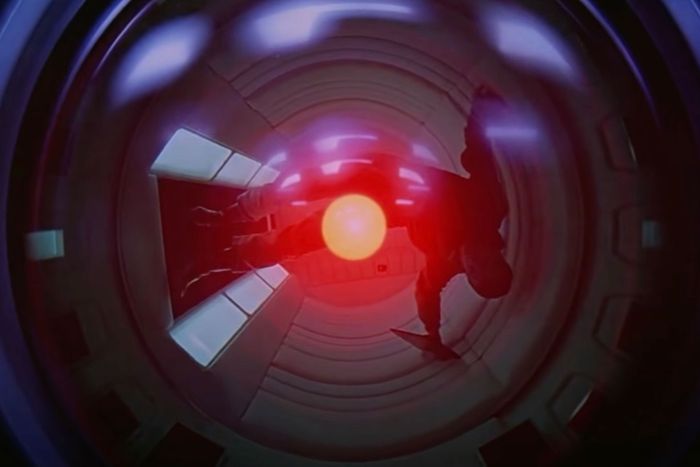
If there’s one thing Hollywood people know about, it’s robot overlords. They all watched 2001: A Space Odyssey! They know what happens when robots run loose! In fact, it’s a part of what the guilds are attempting to avoid with the current SAG-AFTRA and WGA strikes. Hollywood strikes historically occur when technology is changing and contracts haven’t caught up. With advancements in AI happening seemingly on the daily, the guilds are nervous about what could happen if they don’t get their AI policies in check before the technology progresses to the point where they’re screwed out of their jobs.
That’s partially because of historical precedent — antiquated contracts cost the WGA a lot of money in the ’80s and after. Basically, the contract was developed before VHS and DVD became a lot easier to manufacture, but the talent never got a better deal. “The residual formula for home video, which was technological change at the time, was agreed to in the ’80s and never got updated,” Jonathan Handel, an entertainment journalist and lawyer, tells Vulture. “It swept 80 percent of the revenue off the table before calculating the residual, and that was reflective of the cost of manufacturing VHS tape cassettes. Then discs came along and you could stamp content out in quantity for pennies, and the formula never became more lucrative for talent.” Given the strikes, we can see how hard it is to make a good contract — it’s even harder to change a contract’s language once it’s written. “Contracts are like Roach Motels,” Handel says. “Contract clauses check in, but they don’t check out.” So when there’s a resident, you want to make sure it’s one you can live with. But not all of the guilds want or need exactly the same thing when it comes to AI. With that in mind, a rundown of various guilds’ contract disputes regarding AI.
The DGA finalized a contract. What did it get?
While the WGA and SAG-AFTRA are currently on strike, the Directors Guild is sitting off to the side. On June 23, it finalized its contract with the AMPTP, which included the first guidelines about AI for any guild contract. The DGA describes the new contract as a “Groundbreaking agreement confirming that AI is not a person and that generative AI cannot replace the duties performed by members.” The agreement also states that “ Employers may not utilize GAI [Generative AI] in connection with creative elements without consultation with the Director or other DGA-covered employees consistent with the requirements of the DGA Basic Agreement,” according to Variety. Additionally, the DGA will receive two meetings per year with the AMPTP to discuss advances in the technology.
What does the WGA want regarding AI?
While the DGA managed to come to an agreement with their deal, the WGA and SAG-AFTRA aren’t so happy. AI has become one of the mobilizing forces in the WGA’s fight against the AMPTP. In a May 1 document, the WGA detailed asks to the AMPTP, including that it “regulate use of artificial intelligence on MBA covered projects” and that “AI can’t write or rewrite literary material; can’t be used as source material; and MBA-covered material can’t be used to train AI.” In the same document, the AMPTP’s counteroffer was described: “Rejected our proposal. Countered by offering annual meetings to discuss advancements in technology.”
Why is SAG-AFTRA worried about AI?
Probably because they saw “Joan Is Awful.” While the WGA doesn’t seem to want to include any AI in their process, SAG seems more interested in monitoring the rights of actors as AI becomes part of their process. “We’re not here to block AI,” SAG-AFTRA national executive director Duncan Crabtree-Ireland told MSNBC on July 16. “What we are here to do is put guardrails in that make sure that our members won’t be abused by this process and that they will still have careers three years from now.” Those guardrails were spelled out in a document released by SAG-AFTRA on July 17 proposing they “Establish a comprehensive set of provisions to protect human-created work and require informed consent and fair compensation when a ‘digital replica’ is made of a performer, or when their voice, likeness, or performance will be substantially changed using AI.” SAG-AFTRA’s telling of the AMPTP’s response, while lacking specific counteroffers, makes it clear the response was not satisfactory. “Failed to address many vital concerns, leaving principal performers and background actors vulnerable to having most of their work replaced by digital replicas,” it reads.
And can we talk about IATSE for a second?
While the contract for the International Alliance of Theatrical Stage Employees isn’t up until next year, that doesn’t mean members aren’t thinking. IATSE, which covers skilled labor in the entertainment industry, is vulnerable to AI’s potential. As such, in May, it created a Commission of Artificial Intelligence, which released its Core Principles for Applications of Artificial Intelligence and Machine Learning Technology on July 5. The Core Principles covered seven topics: Research, Collaboration, Education, Political and Legislative Advocacy, Organizing, and Collective Bargaining. Like SAG-AFTRA, IATSE is not interested in banning AI from the workplace, but is interested in seeing it as a tool for workers, rather than a replacement. While IATSE’s demands to the AMPTP will not become perfectly clear until contract negotiations begin next year, its point on collective bargaining does elucidate the guild’s perspective. “We commit to negotiating provisions that address AI into our future contracts,” the section states. “IATSE demands transparency from employers regarding their use of AI, even in the absence of relevant government legislation. We are dedicated to safeguarding our members’ privacy rights and ensuring that AI applications adhere to the highest ethical standards, including non-discrimination and fairness.”


